Naples, Italy
Every night at midnight assholes in our neighborhood let off with a barrage of fireworks. Why? WTF? The first night I joked that it must be a cover for the Camorra but it's not funny anymore. Is it some religious celebration? What?! Come on. Fireworks are bullshit. Even the seagulls complain about them. OK. Finally they're done. G'night.
Showing posts with label Italy. Show all posts
Showing posts with label Italy. Show all posts
01/12/2018
Blue bucket
Naples, Italy
Why take the stairs when you have a blue bucket? Daily life in an old world.
Why take the stairs when you have a blue bucket? Daily life in an old world.
Labels:
EU,
Italy,
moments,
my videos,
Naples,
street scenes,
travel notes,
videos
22/09/2017
Autumn Equinox
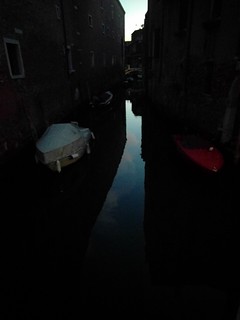 |
| Vienna at twilight |
Labels:
EU,
Italy,
my photos,
solstices & equinoxes
16/08/2017
Venice, truth and illusion
Venice, Italy
What can I say that hasn't been said about Venice a million++ times? And, of the hundreds of photos I took of Venice, what can I post that isn't already a cliche? But we were there for the two weeks straddling July and August so, for my own record, I leave mention.
For starters, I don't know which will destroy Venice first, sea rise due to human caused climate change or us humans tromping through it's crumbling maze. Beautiful, timeworn, sea-wrecked Venice.
It's listed as a UNESCO World Heritage Site yet is "close to losing its hallowed status in exchange for a place on the "In-Danger" list - a category normally reserved for war-ravaged ruins and dilapidated historical sites in Third World countries".
What hope is there for poor Venice? I think of myself as fairly savvy about these things but still that didn't stop me from touching a brick in one of its ancient walls then being "startled" when red silt gushed from it like blood from a wound.
Of course, like everyone else, we were put off by the hoards of other tourists. Some 70,000+ people pour into Venice daily even though it's more an apparition than a place. However, most are day trippers or cruise ship passengers there only for a few hours. The majority want to see the same things so, if you're willing to walk, you can explore Venice more or less on your own. That's what we did. It's what we always do.
We did not take a gondola. It costs about €80 per boat ($95 US). At twilight, the price goes up to around €100. However, we did take the Grand Canal ferry. That cost us €7 each. Never mind we got on the wrong boat, an island hopper, and missed the canal altogether. We rode it to the end and hopped a return ferry which did go through the Grand Canal. I highly recommend it.
On our last two days there we attended the 57th Venice Biennale. Since it began in 1895, the venue has grown so huge, it is now more of an expedition into strange lands than anything resembling an "art show". The exhibits are organized by country and the two main locations alone house miles of art . . . installations, performance, cinema, music, spectacle from around the world.
Also, the grounds themselves are historic and fascinating. And, beyond the two main venues, small exhibitions are tucked into various buildings within the city maze. We stumbled onto a few but missed most.
Recorded in the Venice Arsenale.
I love the sound the old building makes.
video by anonymous
If you travel at all, are thinking of trying it out, are an artist, lover of art, lover of spectacle, a history buff or whatever, consider attending the next Biennale in 2019. I hope by then Venice will have established daily tourist caps. In any case, if you plan on going, plan ahead.
More photos here.
 |
| Venice - one fish eating another? |
What can I say that hasn't been said about Venice a million++ times? And, of the hundreds of photos I took of Venice, what can I post that isn't already a cliche? But we were there for the two weeks straddling July and August so, for my own record, I leave mention.
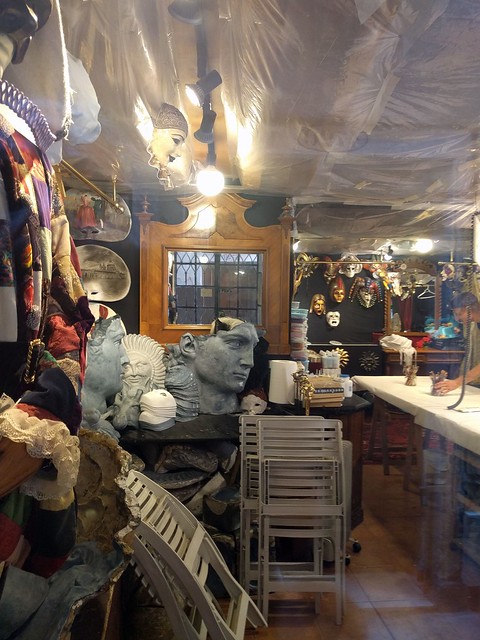 |
| Merchant in Venice |
For starters, I don't know which will destroy Venice first, sea rise due to human caused climate change or us humans tromping through it's crumbling maze. Beautiful, timeworn, sea-wrecked Venice.
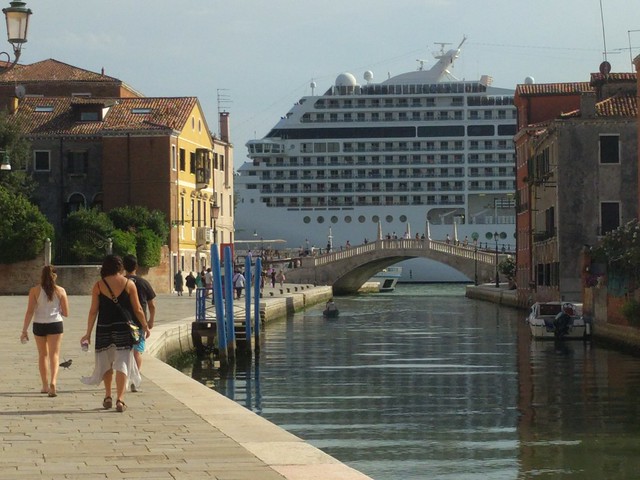 |
| Venice, Italy with cruise ship |
It's listed as a UNESCO World Heritage Site yet is "close to losing its hallowed status in exchange for a place on the "In-Danger" list - a category normally reserved for war-ravaged ruins and dilapidated historical sites in Third World countries".
 |
| Venetian wall |
What hope is there for poor Venice? I think of myself as fairly savvy about these things but still that didn't stop me from touching a brick in one of its ancient walls then being "startled" when red silt gushed from it like blood from a wound.
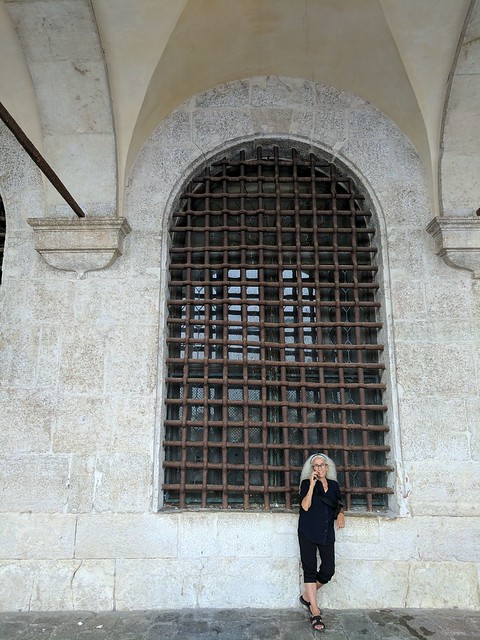 |
| Damn. I really am part of the problem. photo by anonymous |
Of course, like everyone else, we were put off by the hoards of other tourists. Some 70,000+ people pour into Venice daily even though it's more an apparition than a place. However, most are day trippers or cruise ship passengers there only for a few hours. The majority want to see the same things so, if you're willing to walk, you can explore Venice more or less on your own. That's what we did. It's what we always do.
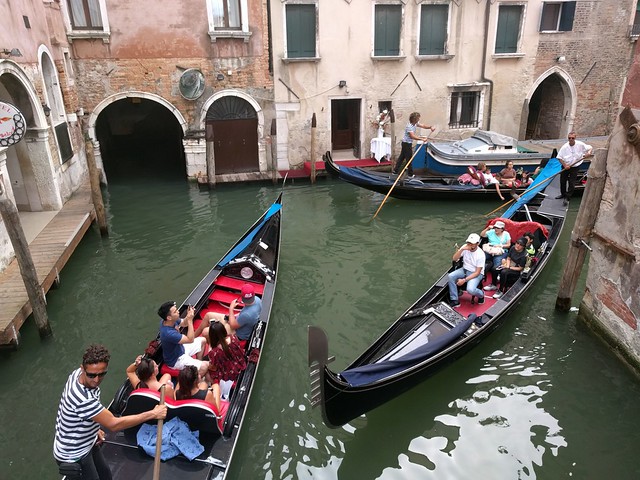 |
| Gondola jam |
We did not take a gondola. It costs about €80 per boat ($95 US). At twilight, the price goes up to around €100. However, we did take the Grand Canal ferry. That cost us €7 each. Never mind we got on the wrong boat, an island hopper, and missed the canal altogether. We rode it to the end and hopped a return ferry which did go through the Grand Canal. I highly recommend it.
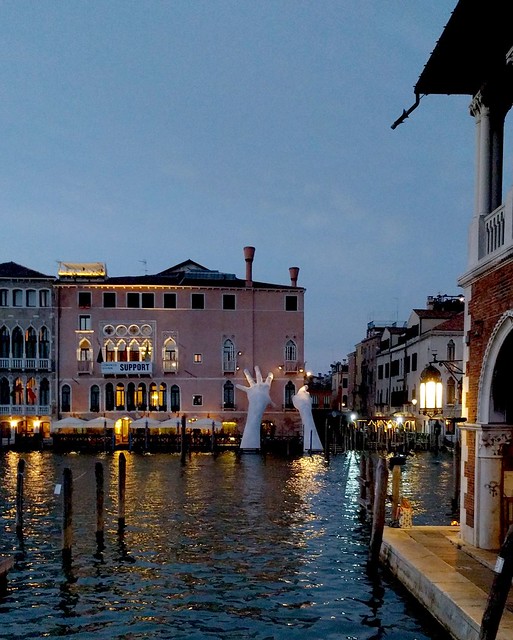 |
| - Support - Sculpture by Lorenzo Quinn as seen from the ferry. 57th Venice Biennale |
On our last two days there we attended the 57th Venice Biennale. Since it began in 1895, the venue has grown so huge, it is now more of an expedition into strange lands than anything resembling an "art show". The exhibits are organized by country and the two main locations alone house miles of art . . . installations, performance, cinema, music, spectacle from around the world.
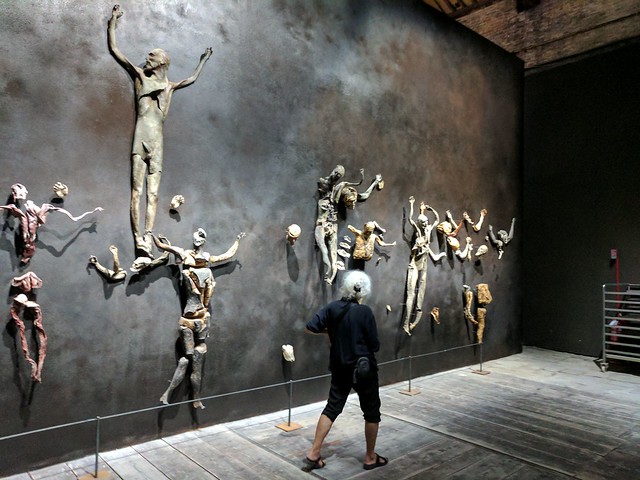 |
| Roberto Cuoghi, The Imitation of Christ photo: anonymous |
Also, the grounds themselves are historic and fascinating. And, beyond the two main venues, small exhibitions are tucked into various buildings within the city maze. We stumbled onto a few but missed most.
Recorded in the Venice Arsenale.
I love the sound the old building makes.
video by anonymous
If you travel at all, are thinking of trying it out, are an artist, lover of art, lover of spectacle, a history buff or whatever, consider attending the next Biennale in 2019. I hope by then Venice will have established daily tourist caps. In any case, if you plan on going, plan ahead.
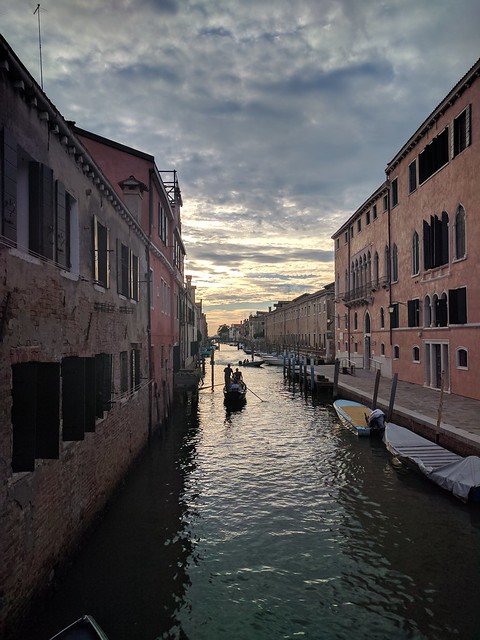 |
| Venice at twilight |
More photos here.
Labels:
art notes,
EU,
Italy,
The Arts,
travel notes
05/08/2017
Cimitero Monumentale
I didn't intend to but I spent all morning reading and commenting about Trump again. So irritating. It's such a flaming shit show. Everyday there's a new outrage. I'm glad Mueller has finally impaneled a grand jury. They've got to nail these bastards.
OK. Breathe. Breathe.
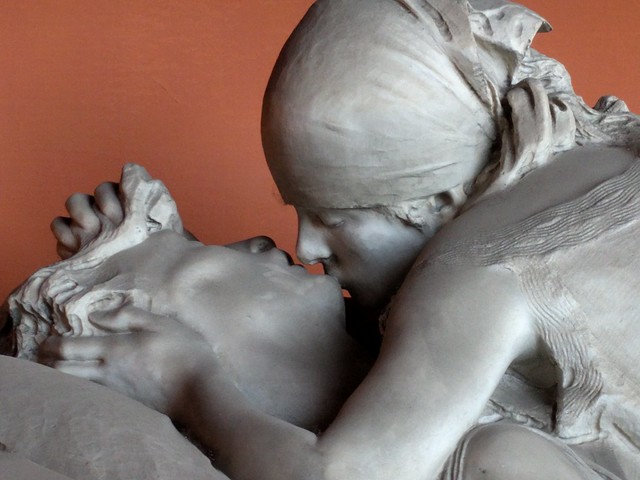 |
| Kiss of Death |
Now . . . back to Milan.
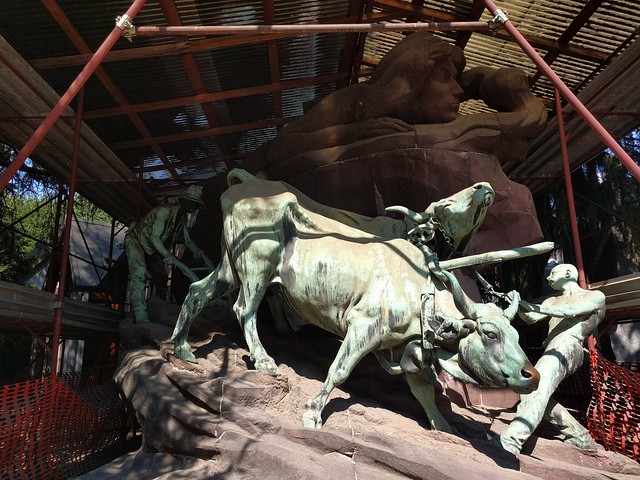 |
| One of the grander tombs |
Of all that I saw in Milan, the Cimitero Monumentale (Monumental Cemetery) was the most remarkable. This cemetery, founded in 1866, houses acres of amazing works in marble . . . everything from ornately carved name plates, portraits, busts, and figures to entire scenes, obelisks, and sepulchers. The artistry rivals many, if not most, museum pieces I've ever seen.
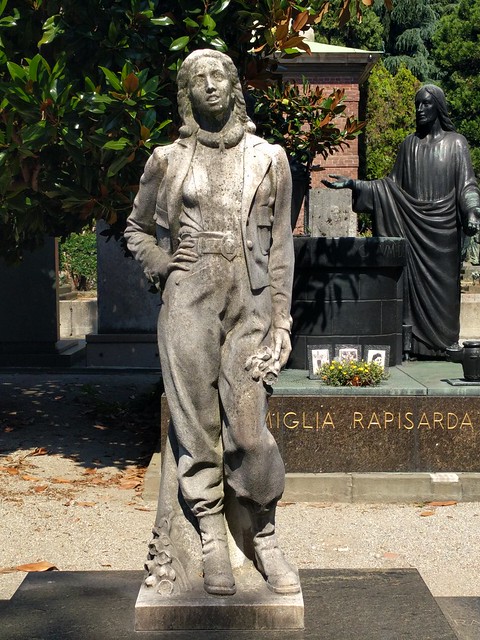 |
Some of the tombs depict the life, others betray the vanity, of the dearly departed. More importantly, most are extraordinarily expressive, making love, in life and in death, visceral.
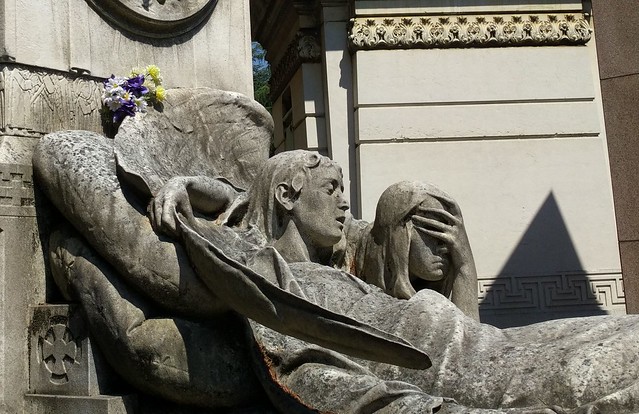 |
| The tomb of Zaira Brivio B. 1876 -- D. 1896 |
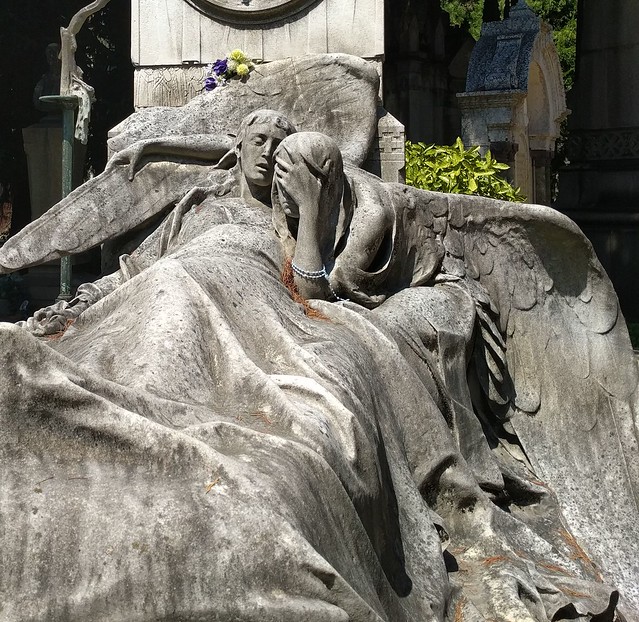 |
| The tomb of Zaira Brivio B. 1876 -- D. 1896 |
On another day, we visited Milan's Brera Art Gallery (Pinacoteca di Brera). The museum's collection was not the best but there were highlights. My favorite was Caravaggio's Supper at Emmaus,
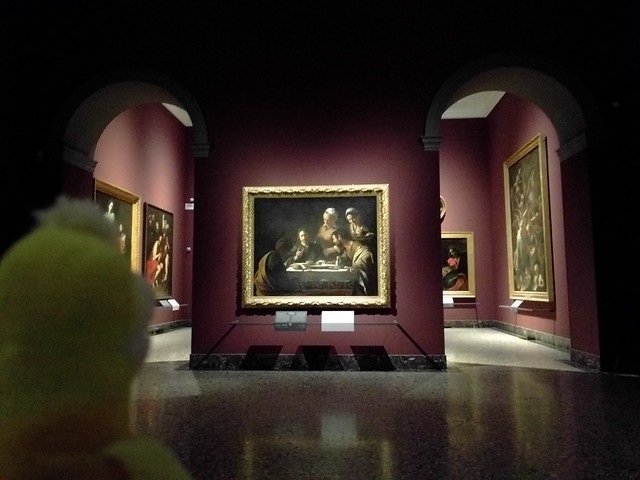 |
| Supper at Emmaus by Caravaggio Pinacoteca di Brera museum - Milan, Italy |
M. Lee's was an early perspective painting by Jacopo Tintoretto - St Mark Working Many Miracles
 |
| Jacopo Tintoretto - St Mark Working Many Miracles attribution: Tintoretto [Public domain], via Wikimedia Commons |
This summer we are moving around a lot more than usual. Since July 4, we've been in London a week, Basel Switzerland a week, Milan a week and now, many many photos later, we've been in Venice for almost two weeks. It's very hot. This Wednesday we leave for Ljubljana, Slovenia.
Labels:
art notes,
EU,
Italy,
Milan,
street scenes,
The Arts,
travel notes
29/07/2017
Milano
The best part of Milan was having dinner on a warm July evening with new friends in a pleasantly crowded courtyard cafe. It all felt very Italian until I declined the after-dinner coffee although, to their credit, everyone graciously pretended they weren't dismayed by my response. I was sorry to drop out of the flow but I like to sleep at night.
It's certainly not that I don't like coffee. I drink coffee by the mugful. It's one of the few things most of us Americans still agree on, the mug, though it's not so important in the rest of the world. We've stayed in over 50 Airbnb apartments, mostly outside the US, and of those only a couple were stocked with American-sized mugs. And, if you're traveling outside the US, forget about refills. If you want more coffee you buy another cup, full price. Say what you will about the treasonous dimwit and crew currently infesting the White House, at least in America it's possible to find a diner that still pours the proverbial endless cup. Not to say Italians don't love coffee. It ranks not far below the hallowed wine itself, but no sloshing gallons for them. In Italy coffee is a ritual so, as M. Lee recently forwarded me the Ten Commandments of Coffee, I've included them here for your convenience, should you be planning a first trip to Italy.
Beyond that dinner, the Basilica of St. Ambrose (Basilica of Sant'Ambrogio) was one of my two favorite sites in Milan. The 1600 year-old basilica doesn't look that impressive from the outside. Its decorative plaster and bright frescoes are long gone leaving bare brick which makes it seem more like a garden house than important historical site.
I had to remind myself that St. Ambrose built his cathedral in the 4th century, 800 years before Cambodia's crumbling Angkor Wat was built which, by comparison, seemed so much older. Of course, over the centuries, parts of the basilica have also collapsed, been torn down, re-built, built up or over. It's like George Washington's axe which is said to be the very one young George used to chop down the legendary cherry tree, although both the head and handle have since been replaced.
St. Ambrose died in Milan in 397 and he, and his two companions, have laid in the crypt below the alter ever since—give or take a few centuries during which time they disappeared.
Next . . . the Cimitero Monumentale.
It's certainly not that I don't like coffee. I drink coffee by the mugful. It's one of the few things most of us Americans still agree on, the mug, though it's not so important in the rest of the world. We've stayed in over 50 Airbnb apartments, mostly outside the US, and of those only a couple were stocked with American-sized mugs. And, if you're traveling outside the US, forget about refills. If you want more coffee you buy another cup, full price. Say what you will about the treasonous dimwit and crew currently infesting the White House, at least in America it's possible to find a diner that still pours the proverbial endless cup. Not to say Italians don't love coffee. It ranks not far below the hallowed wine itself, but no sloshing gallons for them. In Italy coffee is a ritual so, as M. Lee recently forwarded me the Ten Commandments of Coffee, I've included them here for your convenience, should you be planning a first trip to Italy.
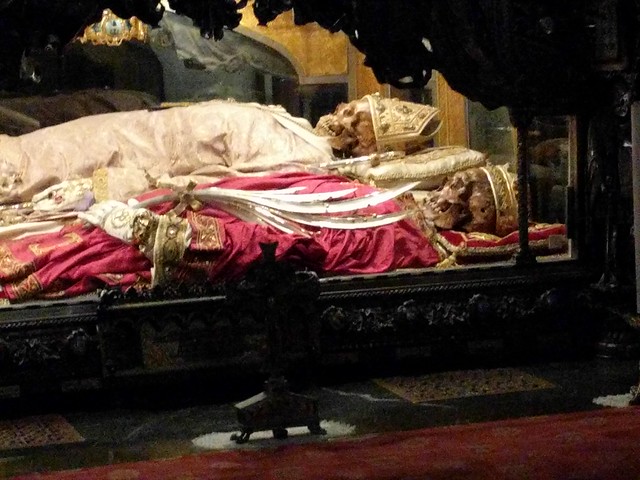 |
| Skeletons of St. Ambrose and his two companions |
Beyond that dinner, the Basilica of St. Ambrose (Basilica of Sant'Ambrogio) was one of my two favorite sites in Milan. The 1600 year-old basilica doesn't look that impressive from the outside. Its decorative plaster and bright frescoes are long gone leaving bare brick which makes it seem more like a garden house than important historical site.
I had to remind myself that St. Ambrose built his cathedral in the 4th century, 800 years before Cambodia's crumbling Angkor Wat was built which, by comparison, seemed so much older. Of course, over the centuries, parts of the basilica have also collapsed, been torn down, re-built, built up or over. It's like George Washington's axe which is said to be the very one young George used to chop down the legendary cherry tree, although both the head and handle have since been replaced.
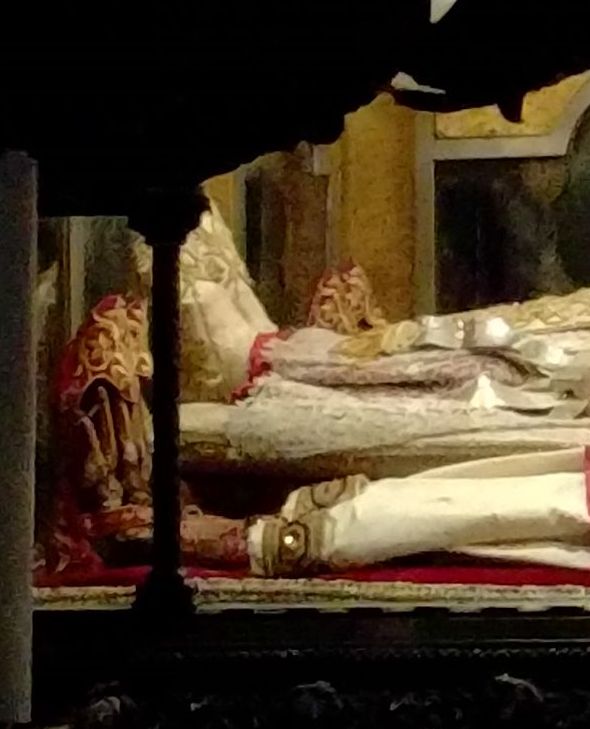 |
| White slippers cover St. Ambrose's feet. The foot bones of one of his companions are exposed. |
St. Ambrose died in Milan in 397 and he, and his two companions, have laid in the crypt below the alter ever since—give or take a few centuries during which time they disappeared.
Next . . . the Cimitero Monumentale.
Labels:
EU,
Italy,
Milan,
travel notes
14/05/2016
Day trip to the past
The way we travel, it's normal for us to walk miles in a day and get back to our apartment late. By that point, I don't have the time, energy or inclination to do a proper post, hence I usually end up writing little or nothing about the wonders we see.
Our recent visit to Ostia Antica, a huge archeological site about 30 kilometers from Rome, was no exception. It was a 12 hour extravaganza of wonders.
Archaeological sites and museums are our downfall. We linger and this is where it gets complicated because, when I linger, there is suddenly so much to see... and so much to learn that I didn't know I want to know.
For example, archaeologists date the beginnings of Ostia Antica in the 4th century BC and mark its high point in the 2nd and 3rd centuries AD. At that time it had around 100,000 inhabitants.
That makes the Ostia Antica of today a 2000 year-old Roman ghost town. How can we rush though a place like that? And, undoubtedly, we're not the only ones who have enjoyed lingering there.
Certainly residents, seafarers, traders and perhaps even a few pirates have lingered and enjoyed convivial conversation in the tavern at the old crossroads across the street from that headless naked guy. And probably many of those people went over to the communal latrine later for another good long chat.
But all things pass and Ostia Antica was finally abandoned in the 9th century though that didn't stop pirates from repeatedly sacking the place during its decline. Even the sea and Tiber river eventually moved away leaving the town landlocked. Then, six hundred years later, Cardinal Giulliano della Rovere, the man who later became Pope Julius II, showed up on the scene.
He was known as the fearsome warrior Pope. Those who crossed him payed the price, sometimes with their life. He is also the Pope who commissioned Michelangelo to paint the Sistine Chapel. But as a Cardinal in 1483, della Rovere began a major renovation of a centuries old Papal castle located just outside Ostia Antica and took many tons of marble from the city for his project. I guess that counts as recycling.
A little went for decoration but most of the marble was crushed, along with the history it represented, plus lime to make mortar to hold the castle's giant stones in place. About a hundred years later, after an extraordinary flood, the Papacy abandoned the place. It was a prison for awhile, sat empty for a couple of centuries and was finally restored in the 19h century to exhibit the first findings from the excavations at Ostia Antica. We noticed it as we were heading back to the train after our very long day but, naturally, went over to have a look.
I didn't start out with the intention of going into all that. This is the problem with visiting a place like Rome and its suburbs, if there even is another place like Rome and its suburbs. Nearly every little thing represents at least a thousand years of history. Fascinating, yes, but a very sticky web to quickly navigate.
Even Ostia Antica, stripped to the bone a thousand years ago, and possibly the most poorly curated major archeological site on the face of the earth, was fascinating. We dragged away.
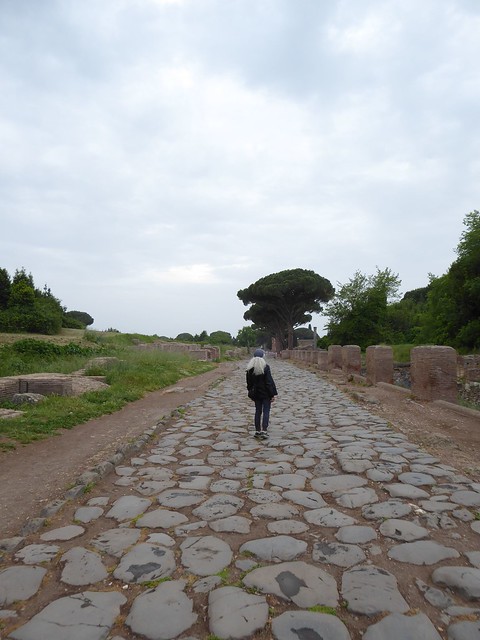 |
| Road to Ostia Antica |
Our recent visit to Ostia Antica, a huge archeological site about 30 kilometers from Rome, was no exception. It was a 12 hour extravaganza of wonders.
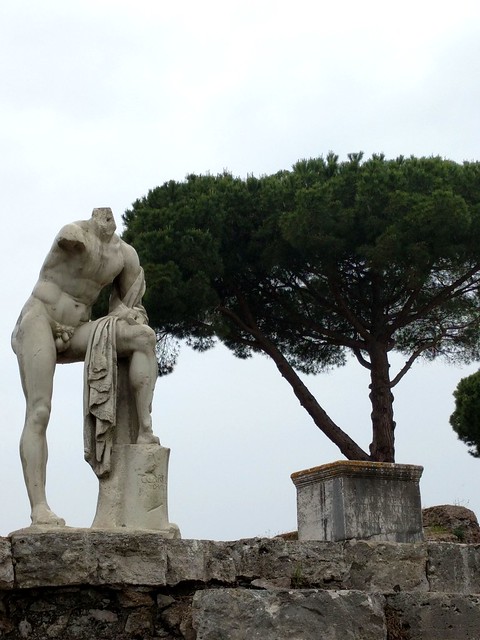 |
| Temple figure at the oldest crossroads in Ostia Antica |
Archaeological sites and museums are our downfall. We linger and this is where it gets complicated because, when I linger, there is suddenly so much to see... and so much to learn that I didn't know I want to know.
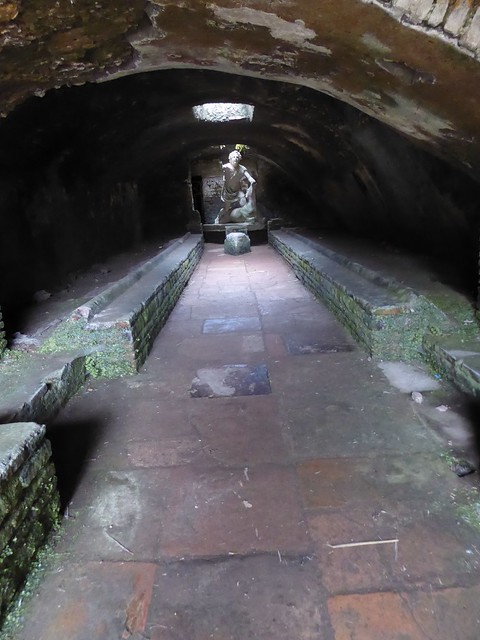 |
| Disturbing Mithraeum of the Baths of Mithras Ostia Antica |
For example, archaeologists date the beginnings of Ostia Antica in the 4th century BC and mark its high point in the 2nd and 3rd centuries AD. At that time it had around 100,000 inhabitants.
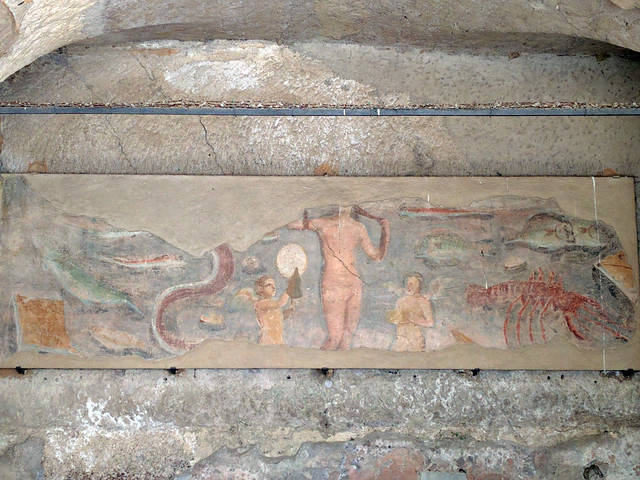 |
| Fresco remains |
That makes the Ostia Antica of today a 2000 year-old Roman ghost town. How can we rush though a place like that? And, undoubtedly, we're not the only ones who have enjoyed lingering there.
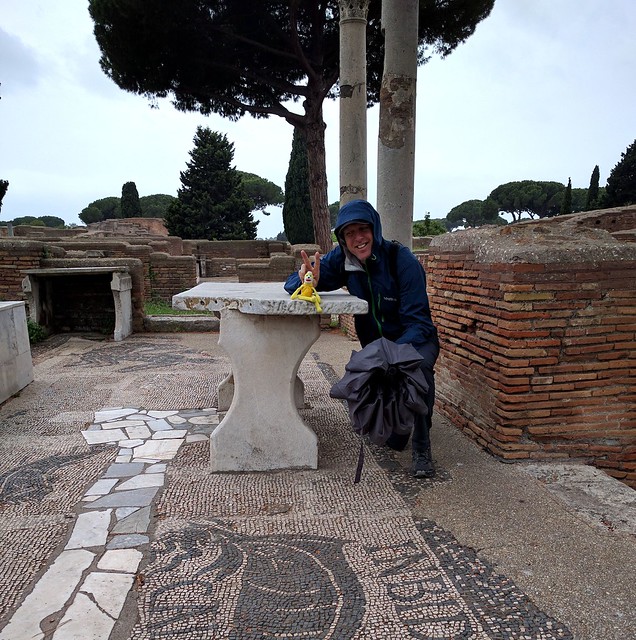 |
| Tavern at the crossroads complete with shady characters. |
Certainly residents, seafarers, traders and perhaps even a few pirates have lingered and enjoyed convivial conversation in the tavern at the old crossroads across the street from that headless naked guy. And probably many of those people went over to the communal latrine later for another good long chat.
 |
| Swami surveying Ostia Antica's 24 seat communal latrine. |
But all things pass and Ostia Antica was finally abandoned in the 9th century though that didn't stop pirates from repeatedly sacking the place during its decline. Even the sea and Tiber river eventually moved away leaving the town landlocked. Then, six hundred years later, Cardinal Giulliano della Rovere, the man who later became Pope Julius II, showed up on the scene.
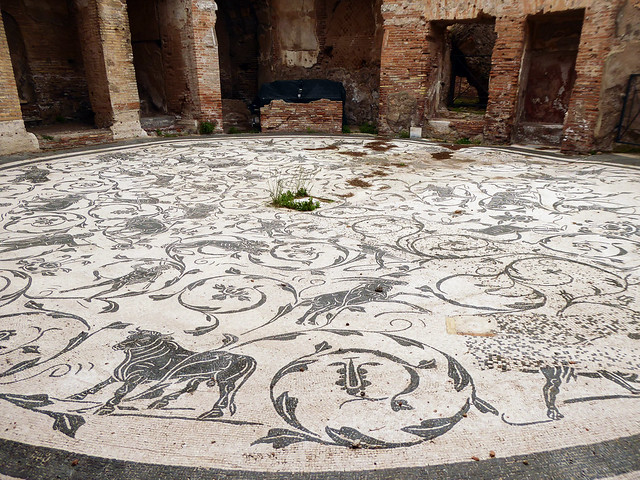 |
| Typical floor in Ostia Antica |
He was known as the fearsome warrior Pope. Those who crossed him payed the price, sometimes with their life. He is also the Pope who commissioned Michelangelo to paint the Sistine Chapel. But as a Cardinal in 1483, della Rovere began a major renovation of a centuries old Papal castle located just outside Ostia Antica and took many tons of marble from the city for his project. I guess that counts as recycling.
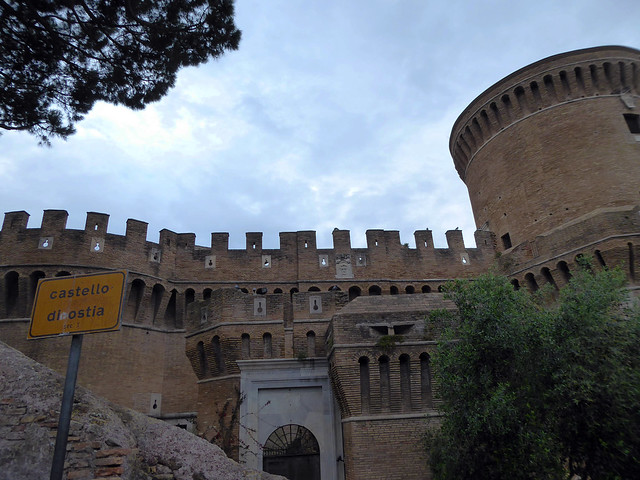 |
| Marble arch to the Castle of Julius II at the end of day. |
A little went for decoration but most of the marble was crushed, along with the history it represented, plus lime to make mortar to hold the castle's giant stones in place. About a hundred years later, after an extraordinary flood, the Papacy abandoned the place. It was a prison for awhile, sat empty for a couple of centuries and was finally restored in the 19h century to exhibit the first findings from the excavations at Ostia Antica. We noticed it as we were heading back to the train after our very long day but, naturally, went over to have a look.
 |
| Cat in his garden by the castle |
I didn't start out with the intention of going into all that. This is the problem with visiting a place like Rome and its suburbs, if there even is another place like Rome and its suburbs. Nearly every little thing represents at least a thousand years of history. Fascinating, yes, but a very sticky web to quickly navigate.
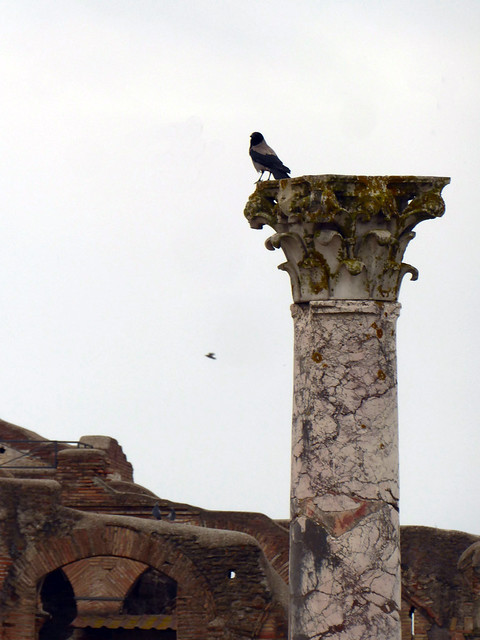 |
| European crow on an ancient marble column |
Even Ostia Antica, stripped to the bone a thousand years ago, and possibly the most poorly curated major archeological site on the face of the earth, was fascinating. We dragged away.
Labels:
EU,
Italy,
travel notes
03/05/2016
Make haste slowly
Florence, Italy
Lee describes the historic center of Florence, birthplace of the Renaissance, as a world suspended in amber. It's a perfect description. In 14th century Florence, the merger of Church and secular wealth, power, ruthlessness and creative energy became a flash point transforming western civilization. The Florence of today is the standing record of that fusion suspended in time for all to see.
We stayed in Florence for two weeks, exploring treasures from both the Renaissance and Medieval periods. The city is full of world famous paintings, sculpture and architecture by men such as Brunelleschi, the oldest of the the founding fathers of the Renaissance, Leonardo da Vinci, Raphael, Donatello, Titian, Michelangelo, Botticelli and others. Lisa del Giocondo, the woman Michelangelo painted as the Mona Lisa, lived and is buried in Florence.
Galileo and Michelangelo are also buried there. Dante, however, is not buried there. In 1302 he found himself on the wrong side of a political conflict involving the Pope and in 1315, refusing to pay the fine, was condemned to permanent exile from his beloved Florence or be burned at the stake. In 2008 the city council of Florence passed a motion rescinding his death sentence but thus far the city of Ravenna refuses to give back his bones.
Otherwise, Florence claims many honors. According to wikitravel, Florentines reinvented money, the gold florin which became the engine that drove Europe out of the "Dark Ages". Florentine bankers also financed the first route around Africa to India and the Far East. The Americas were named after a Florentine, Amerigo Vespucci. Florentines also pioneered the use of the vernacular, thus ending the use of Latin as the common language. They invented opera and Ferdinando de' Medici made possible the invention of the piano through his patronage of Bartolomeo Cristofori, a harpsichord builder from Padua.
As for me, the unfinished sculptures Michelangelo were especially powerful, his abandoned figures half-released from the stone. Initially I assumed the unfinished pieces, the rough work, were done by assistants but, when I mentioned this to Lee, he said Michelangelo did most of the work himself, frequently working through the night and, when he did rest, often slept in his boots and clothes. That impressed me and so I read up on him. His biographer Paolo Giovio wrote that "Michelangelo's nature was so rough and uncouth that his domestic habits were incredibly squalid, and deprived posterity of any pupils who might have followed him." Various biographers describe him as solitary and melancholy although he did love one man, Tommaso dei Cavalieri
 |
| Florence, Italy |
Lee describes the historic center of Florence, birthplace of the Renaissance, as a world suspended in amber. It's a perfect description. In 14th century Florence, the merger of Church and secular wealth, power, ruthlessness and creative energy became a flash point transforming western civilization. The Florence of today is the standing record of that fusion suspended in time for all to see.
 |
| Reliquary belonging to House of Medici Florence, Italy |
We stayed in Florence for two weeks, exploring treasures from both the Renaissance and Medieval periods. The city is full of world famous paintings, sculpture and architecture by men such as Brunelleschi, the oldest of the the founding fathers of the Renaissance, Leonardo da Vinci, Raphael, Donatello, Titian, Michelangelo, Botticelli and others. Lisa del Giocondo, the woman Michelangelo painted as the Mona Lisa, lived and is buried in Florence.
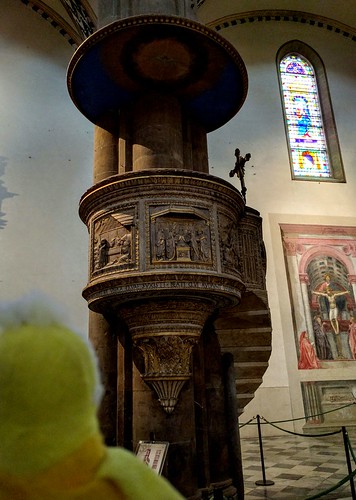 |
| Galileo was first denounced from this pulpit, an event which culminated in him being tried for heresy during the Inquisition. Florence |
Galileo and Michelangelo are also buried there. Dante, however, is not buried there. In 1302 he found himself on the wrong side of a political conflict involving the Pope and in 1315, refusing to pay the fine, was condemned to permanent exile from his beloved Florence or be burned at the stake. In 2008 the city council of Florence passed a motion rescinding his death sentence but thus far the city of Ravenna refuses to give back his bones.
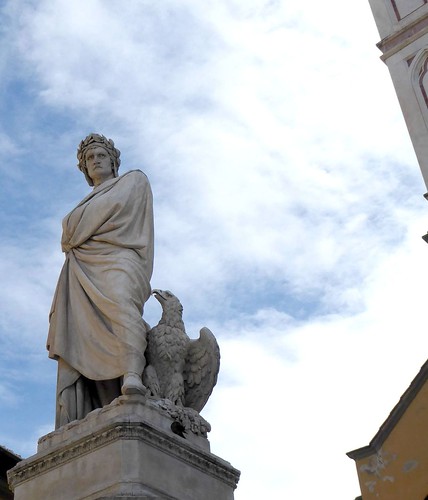 |
| Dante and eagle outside the Duomo Florence |
Otherwise, Florence claims many honors. According to wikitravel, Florentines reinvented money, the gold florin which became the engine that drove Europe out of the "Dark Ages". Florentine bankers also financed the first route around Africa to India and the Far East. The Americas were named after a Florentine, Amerigo Vespucci. Florentines also pioneered the use of the vernacular, thus ending the use of Latin as the common language. They invented opera and Ferdinando de' Medici made possible the invention of the piano through his patronage of Bartolomeo Cristofori, a harpsichord builder from Padua.
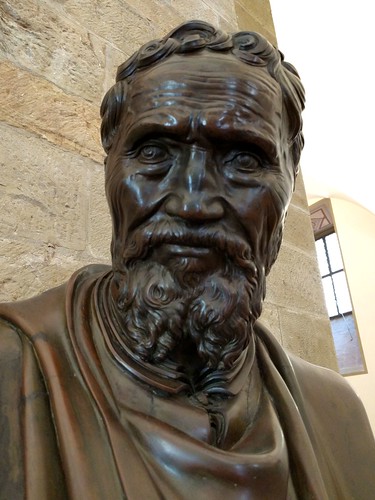 |
| When Michelangelo was an apprentice a rival punched him in the nose "mashing it like a biscuit". It remained that way the rest of his life. Bargello Museum - Florence Italy |
As for me, the unfinished sculptures Michelangelo were especially powerful, his abandoned figures half-released from the stone. Initially I assumed the unfinished pieces, the rough work, were done by assistants but, when I mentioned this to Lee, he said Michelangelo did most of the work himself, frequently working through the night and, when he did rest, often slept in his boots and clothes. That impressed me and so I read up on him. His biographer Paolo Giovio wrote that "Michelangelo's nature was so rough and uncouth that his domestic habits were incredibly squalid, and deprived posterity of any pupils who might have followed him." Various biographers describe him as solitary and melancholy although he did love one man, Tommaso dei Cavalieri
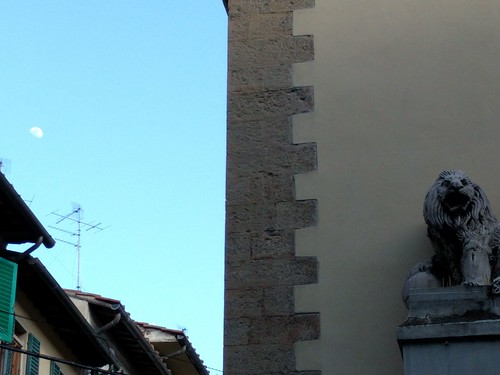 |
| — Festina lente — (make haste slowly) Motto adopted by the House of Medici. Florence morning |
Labels:
art notes,
EU,
Italy,
museum crawl,
The Arts,
travel notes,
UNESCO World Heritage Sites
16/04/2016
Italy at last
Florence, Italy
We've been skirting Italy for the last year and saw Roman's ruins and its influence everywhere, Turkey, Portugal, Spain, Croatia, England, the Netherlands, Germany, the Czech Republic, I mean Czechia. Just yesterday the Czech Republic officially announced their country's new name, Czechia. And when people say Roman, they are referring to Italy in the overall, aren't they? Italian art, sculpture, architecture. At least as influence. So finally we are in Italy. In spite of the fact that I had great expectations about this place, in spite of the fact that we've been working up it it for the last year, still it is fabulous.
Around the Mediterranean giant palaces and cathedrals remain that were built when Rome was the center of the Western world, isolated grandeur, World Heritage sites, but here in Italy that style was a way of life. But I've said enough. I'm not a historian and I don't have the time to research every word I write so ... enough. Florence is amazing in spite of the fact that internet in our neighborhood, sucks.
Even Project Fi, Google's international phone network, is weak where we're staying. It worked even in Czechia's tiny Český Krumlov, but not here. The Renaissance began in Florence but, at least at this point, it seems to be a bit of a technological backwater.
And, while I'm on a grind,I might as well add that it's been hard to find oatmeal at a decent price. That, of course, drove M. Lee (the oatmeal fanatic) to look up the history of oatmeal in Italy. Seems you could easily get it 30,000 years ago. The first evidence of humans eating oatmeal anywhere was discovered in a cave in Italy. I hope I'm wrong but, at least so far, Italy seems like an oatmeal backwater as well.
Italy also sucks when it comes to getting a big giant American cup of coffee. Europe in general doesn't do coffee like we do coffee so no surprise that even in this otherwise very cool airbnb the "big" cups hold about two sips. I say big but only compared to the other regular size cups, the thimble size espresso cups. But these are trifles. Florence is fabulous.
We've been skirting Italy for the last year and saw Roman's ruins and its influence everywhere, Turkey, Portugal, Spain, Croatia, England, the Netherlands, Germany, the Czech Republic, I mean Czechia. Just yesterday the Czech Republic officially announced their country's new name, Czechia. And when people say Roman, they are referring to Italy in the overall, aren't they? Italian art, sculpture, architecture. At least as influence. So finally we are in Italy. In spite of the fact that I had great expectations about this place, in spite of the fact that we've been working up it it for the last year, still it is fabulous.
 |
| Door from, or it is to, the past? |
Even Project Fi, Google's international phone network, is weak where we're staying. It worked even in Czechia's tiny Český Krumlov, but not here. The Renaissance began in Florence but, at least at this point, it seems to be a bit of a technological backwater.
And, while I'm on a grind,I might as well add that it's been hard to find oatmeal at a decent price. That, of course, drove M. Lee (the oatmeal fanatic) to look up the history of oatmeal in Italy. Seems you could easily get it 30,000 years ago. The first evidence of humans eating oatmeal anywhere was discovered in a cave in Italy. I hope I'm wrong but, at least so far, Italy seems like an oatmeal backwater as well.
Italy also sucks when it comes to getting a big giant American cup of coffee. Europe in general doesn't do coffee like we do coffee so no surprise that even in this otherwise very cool airbnb the "big" cups hold about two sips. I say big but only compared to the other regular size cups, the thimble size espresso cups. But these are trifles. Florence is fabulous.
 |
| My morning cup of coffee |
Labels:
EU,
Italy,
travel notes
Subscribe to:
Comments (Atom)
